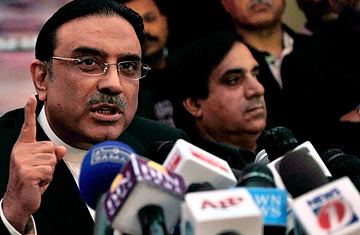
Asif Ali Zardari (left) talks with journalists at a press conference in Lahore, Pakistan.
President Barack Obama recently sent a personal message to Pakistan's President Asif Ali Zardari, urging him to rally his compatriots to help the U.S. fight in Afghanistan. Obama's message may, however, have been sent to the wrong address, because it will likely take all of the the embattled Zardari's political energies — and then some — to simply remain in power. Already weighed down by the burdens of his deep unpopularity, the menace of burgeoning domestic extremism and a sour economy, Zardari faces a new crisis this Saturday with the expiration of an amnesty on corruption charges against him.
The end of the amnesty that paved his path to power will force him to once again to confront the corruption that led to his imprisonment nearly 20 years ago. It comes four months after the recently restored Supreme Court ruled that the 2007 State of Emergency declared by former president General Pervez Musharraf in November 2007 had been unconstitutional and illegal. The amnesty that spared Zardari having to face charges was issued by Musharraf as part of a last-ditch attempt to hang onto power by cutting a deal with Zardari and his late wife, the slain former Prime Minister Benazir Bhutto, who also faced corruption charges. (Zardari had previously served two stints and a total of 11 years behind bars, having been arrested, although never convicted, under former Prime Minister Nawaz Sharif, released when his wife came to power, and then sent back to prison after Sharif was reelected — before being freed under the deal with Musharraf.)
The failure of Zardari's efforts to secure parliamentary support for maintaining the amnesty leaves him, along with more than 8,000 other politicians, bureaucrats and diplomats, at the mercy of Chief Justice Iftikhar Chaudhry. Zardari denies any wrongdoing and maintains that the cases against him are all politically motivated. The timing could not be worse for Zardari. His relationship with the powerful military establishment is under strain; a hostile media routinely advances fresh allegations of corruption; and growing anti-Americanism, fueled by conspiracy theories on Washington's intentions in the region, has left him portrayed as a stooge. His political opponents appear increasingly united, while mounting fury at rising prices, shortages of wheat and sugar, and a wave of terror attacks that Islamabad seems powerless to stanch, have seen his popularity nosedive among a public in front of whom he hasn't appeared for months.
It is not clear whether the corruption charges could could actually push Zardari out of power. "The government of Pakistan believes that while the President of Pakistan is in office, he has immunity from all cases brought by governments before," says presidential spokesperson Farahnaz Ispahani, and legal opinion on the issue is divided. Still, she adds, "These are accusations not convictions. He's not afraid of facing the courts again if the time comes."
The amnesty is certainly providing ammunition for the the parliamentary opposition, which is calling for Zardari and other accused ministers to step down."He's not immune forever," says Khwaja Muhammad Asif, a prominent lawmaker from Nawaz Sharif's Pakistan Muslim League-N (PML-N). "As long as he's in this office, he cannot be served with a warrant. But there is also a moral position — he holds the highest office in the land. For the dignity of that office, he's morally bound, if morality means anything to him, to leave his office and face the charges."
The cases will be something of a legal and political minefield, because, says Ispahani, they were prepared by Musharraf's regime with political intent. And while Zardari's ruling Pakistan People's Party (PPP) publicly expresses confidence in the Supreme Court, some of its members privately fear that Chief Justice Chaudhry, whose sacking by Musharraf Zardari had refused to reverse until forced to by a nationwide protest movement, may not be in a forgiving mood. Opposition figures, however, warn that accused officials could wield undue influence over the prosecution, which is controlled by the government.
Whatever the outcome of Zardari's latest round of legal troubles and the political crisis they portend, their effect is likely to be a further weakening of his grip on power and more distraction from Pakistan's war against extremism.
